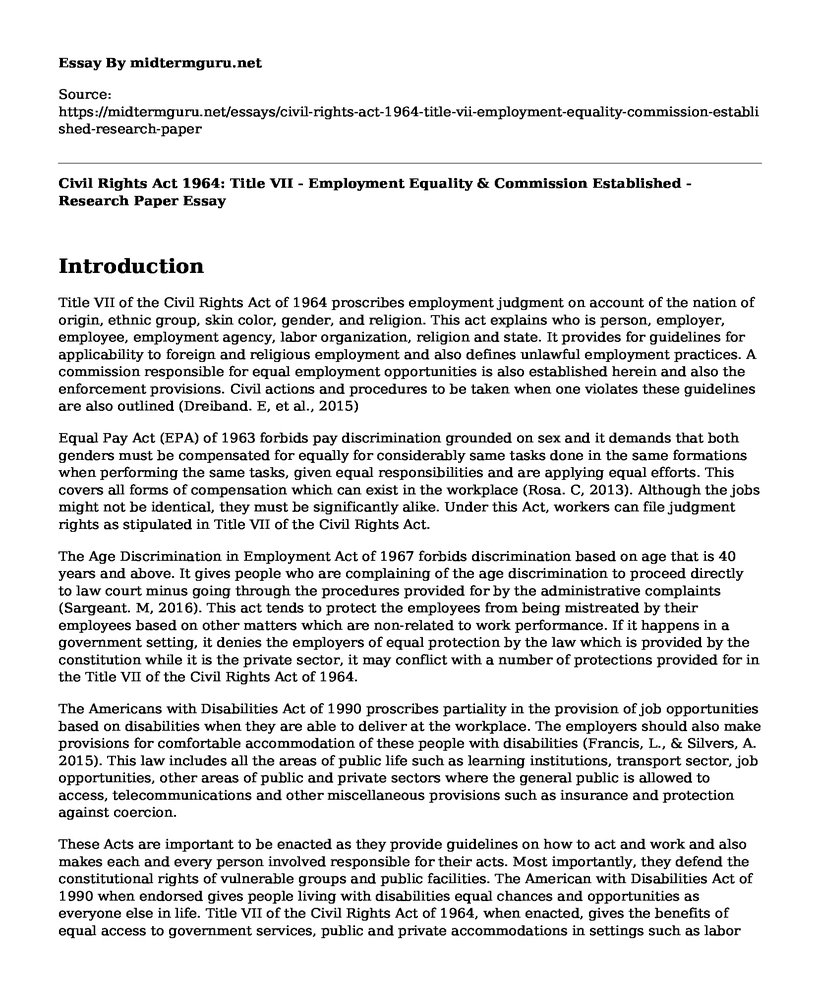Introduction
Title VII of the Civil Rights Act of 1964 proscribes employment judgment on account of the nation of origin, ethnic group, skin color, gender, and religion. This act explains who is person, employer, employee, employment agency, labor organization, religion and state. It provides for guidelines for applicability to foreign and religious employment and also defines unlawful employment practices. A commission responsible for equal employment opportunities is also established herein and also the enforcement provisions. Civil actions and procedures to be taken when one violates these guidelines are also outlined (Dreiband. E, et al., 2015)
Equal Pay Act (EPA) of 1963 forbids pay discrimination grounded on sex and it demands that both genders must be compensated for equally for considerably same tasks done in the same formations when performing the same tasks, given equal responsibilities and are applying equal efforts. This covers all forms of compensation which can exist in the workplace (Rosa. C, 2013). Although the jobs might not be identical, they must be significantly alike. Under this Act, workers can file judgment rights as stipulated in Title VII of the Civil Rights Act.
The Age Discrimination in Employment Act of 1967 forbids discrimination based on age that is 40 years and above. It gives people who are complaining of the age discrimination to proceed directly to law court minus going through the procedures provided for by the administrative complaints (Sargeant. M, 2016). This act tends to protect the employees from being mistreated by their employees based on other matters which are non-related to work performance. If it happens in a government setting, it denies the employers of equal protection by the law which is provided by the constitution while it is the private sector, it may conflict with a number of protections provided for in the Title VII of the Civil Rights Act of 1964.
The Americans with Disabilities Act of 1990 proscribes partiality in the provision of job opportunities based on disabilities when they are able to deliver at the workplace. The employers should also make provisions for comfortable accommodation of these people with disabilities (Francis, L., & Silvers, A. 2015). This law includes all the areas of public life such as learning institutions, transport sector, job opportunities, other areas of public and private sectors where the general public is allowed to access, telecommunications and other miscellaneous provisions such as insurance and protection against coercion.
These Acts are important to be enacted as they provide guidelines on how to act and work and also makes each and every person involved responsible for their acts. Most importantly, they defend the constitutional rights of vulnerable groups and public facilities. The American with Disabilities Act of 1990 when endorsed gives people living with disabilities equal chances and opportunities as everyone else in life. Title VII of the Civil Rights Act of 1964, when enacted, gives the benefits of equal access to government services, public and private accommodations in settings such as labor unions, private employers and other agencies that give jobs and protect them in every aspect of employment. The Equal pay Act enables both genders to enjoy equal payment benefits at workplaces. The Age Discrimination Act is important to be enacted because it protects employees above 40 years of age against work-related discrimination on the basis of their age.
References
Dreiband, E. S., Swearingen, B., & Day, J. (2015). The evolution of Title VII-sexual orientation, gender identity, and the Civil Rights Act of 1964. Jones Day, Cleveland, OH.
Francis, L., & Silvers, A. (Eds.). (2015). Americans with disabilities. Routledge.
Koskinen Sandberg, P. (2016). Non-decision making in the reform of equal pay policy: The case of Finnish gender equality legislation. Equality, Diversity, and Inclusion: An International Journal, 35(4), 280-295.
Sargeant, M. (2016). Age discrimination in employment. Routledge.
Cite this page
Civil Rights Act 1964: Title VII - Employment Equality & Commission Established - Research Paper. (2023, Jan 11). Retrieved from https://midtermguru.com/essays/civil-rights-act-1964-title-vii-employment-equality-commission-established-research-paper
If you are the original author of this essay and no longer wish to have it published on the midtermguru.com website, please click below to request its removal:
- Summary of Case 66C: Alvin Bruce and Square One Inc
- Paper Example on Municipal Courts Slam the Poor Hardest
- Paper Example on Juvenile Delinquency Over A Life Course
- Essay Sample on Cyberstalking
- Civil Rights Act 1964: Title VII - Employment Equality & Commission Established - Research Paper
- Criminal Justice System: A Subculture With Unique Rules & Regulations - Essay Sample
- South Boston Man Admits Murdering Woman - Criminology Essay Sample







